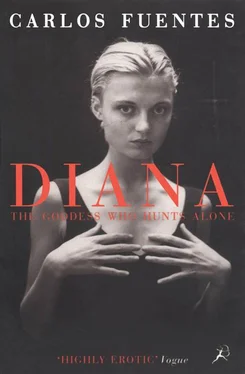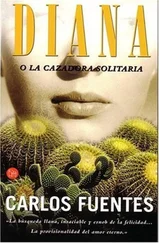Carlos Fuentes - Diana the Goddess Who Hunts Alone
Здесь есть возможность читать онлайн «Carlos Fuentes - Diana the Goddess Who Hunts Alone» весь текст электронной книги совершенно бесплатно (целиком полную версию без сокращений). В некоторых случаях можно слушать аудио, скачать через торрент в формате fb2 и присутствует краткое содержание. Год выпуска: 2012, Издательство: Bloomsbury UK, Жанр: Современная проза, на английском языке. Описание произведения, (предисловие) а так же отзывы посетителей доступны на портале библиотеки ЛибКат.
- Название:Diana the Goddess Who Hunts Alone
- Автор:
- Издательство:Bloomsbury UK
- Жанр:
- Год:2012
- ISBN:нет данных
- Рейтинг книги:3 / 5. Голосов: 1
-
Избранное:Добавить в избранное
- Отзывы:
-
Ваша оценка:
- 60
- 1
- 2
- 3
- 4
- 5
Diana the Goddess Who Hunts Alone: краткое содержание, описание и аннотация
Предлагаем к чтению аннотацию, описание, краткое содержание или предисловие (зависит от того, что написал сам автор книги «Diana the Goddess Who Hunts Alone»). Если вы не нашли необходимую информацию о книге — напишите в комментариях, мы постараемся отыскать её.
Diana the Goddess Who Hunts Alone — читать онлайн бесплатно полную книгу (весь текст) целиком
Ниже представлен текст книги, разбитый по страницам. Система сохранения места последней прочитанной страницы, позволяет с удобством читать онлайн бесплатно книгу «Diana the Goddess Who Hunts Alone», без необходимости каждый раз заново искать на чём Вы остановились. Поставьте закладку, и сможете в любой момент перейти на страницу, на которой закончили чтение.
Интервал:
Закладка:
He’d receive guests around a liquor cabinet in a room equipped with a real bar he’d bought at the Liverpool department store around the corner. It was as well stocked as the Oak Room at the Plaza Hotel in New York — the place where Buñuel liked to drink the “best martinis in the world,” as he put it. Now he was mixing up a buñueloni for me, a delicious but intoxicating mixture of gin, Carpano, and Angostura, and proclaiming, “I drink a liter of alcohol every day. Alcohol’s going to kill me.”
“But you look very well,” I said, admiring his robust physique at the age of seventy, his well-rounded shoulders, his powerful chest, and his arms, strong but thin.
“I just saw the doctor. Here’s the list: I’ve got emphysema, diverticulosis, high cholesterol, and a gigantic prostate. If I deal with them one at a time, I’m in perfect shape. But if they all gang up on me, I’ll drop dead.”
Generally, he wore short-sleeved sport shirts, which accentuated the bareness of his peasant-philosopher head. His baldness and his face creased by time made him look like Picasso, de Falla, Ortega y Gasset. Illustrious Spaniards end up looking like retired picadors. Buñuel came from the same region as Goya, from Aragon, a famous breeding ground of stubborn individuals. The truth is that no one dreams more than the Aragonese. Their wild dreams are about witches’ Sabbaths and communication between men, animals, and insects. Everyone knows that ants are the beings that communicate among themselves best — telepathically, over huge distances — and I think Luis Buñuel had a passion for entomology because the Aragonese, like ants, communicate with one another across space and time. They’re in contact through their nightmares, their witches, their drums.
He wasn’t pleased with me that afternoon. He was a confirmed believer in matrimonial fidelity and in the inviolability of man and wife. It seemed intolerable to him that a couple, having made a pact to live together, should break it. He reproached me openly for abandoning Luisa Guzmán, whom he loved a lot and whom he’d used in one or two of his pictures. But along with that exaltation of the bonds of matrimony, Buñuel did not hide his horror of the sexual act. It was rare in his pictures to see a naked person, except as a necessary counterpoint to the plot; there was never a kiss, which seemed an “indecency” to him, and never fornication, only desire, rolling around in the gardens of the Golden Age, desire forever unsatisfied so as to maintain the flame of passion at its highest intensity.
I looked at his green eyes, as distant as a sea I’d never sailed, and through them I saw sail the ship of Tristan, Buñuel’s secret hero, the hero of chaste, unconsummated love. The Middle Ages was Buñuel’s real era, his natural time, and it was there his gaze navigated; he was accidentally anchored in our “detestable time.” He had to be seen and understood as someone exiled from the past, a foreigner from the thirteenth century almost naked among us, dressed in a short-sleeved sport shirt like a hermit monk given only a loincloth to cover his shame.
It was from that lost era that Buñuel got the idea he was repeating to me now — of sex as a habit of animals, more bestiarum, in the words of Saint Augustine. “Sex,” he was saying, “is a hairy spider, an all-devouring tarantula, a black hole from which you never emerge if you give in to it.” He was deaf (again, like Goya) and had abandoned the use of music in his pictures unless it fit in naturally: a radio, an organ grinder, an orchestra at a ski resort. Before, he’d filled his movies with the infinitely impassioned, sweet, stormy refrains of Wagner’s Liebestraum. The music of Tristan and Isolde was the cantata to chaste love from which the tarantulas of sex have been expelled.
“But Saint John Chrysostom prohibited even chaste love, saying it succeeded only in making passion greater, adding more flames to desire,” I recalled.
“Well, now, don’t you see why it’s the most exciting thing in the world? Sex without sin is like an egg without salt.”
I always fell into his trap. Buñuel preached chastity as the means to augment pleasure, desire, the thirst for the amatory body. He was a reader of Saint Augustine and understood that the Fall only meant that the law of love had been broken. Love has a law, which is to love God. To love ourselves is to break the law of God and start down the road of perdition, which wends lower and lower through the black hole of sex to the final hole of death. To return to love means to pass through chastity, but for that we need help. We can’t do it alone. To return to God from the hell of flesh and its self-gratification is like defying the law of gravity. Not falling but flying.
“Who’s going to help us?” I asked.
“Not power,” he said passionately. “Never those wielding power, whether it’s civil or ecclesiastic. Only the poor, the rebels, the outcasts, children, lovers … only those can help us.”
He said all this with great emotion, and through my memory paraded the abandoned children of his movies, the ardent couples, the damned beggars, the priests humiliated because of their Christian devotion, all those who renounced the vanity of this world and hoped only for the embrace of a brother. Rebels, too? I asked Buñuel. Rebels help us as well?
“If they don’t obey any power,” Luis answered. “If they are totally gratuitous.”
At the time, Buñuel was working on a script for a film he never made, based on the story of the French anarchist Ravachol, who started out as a thief and a murderer. Back in the provinces, he had killed an old ragman and an elderly hermit, violated the grave of a countess, and stabbed to death two spinsters who owned a forge. All that was gratuitous. But one fine day he declared that he’d stolen the hermit’s and the spinster’s money and the jewels buried with the countess for the sake of the anarchist cause.
Even so, the anarchists did not give him their blessing until Ravachol moved to Paris and, with an assistant named Simon the Biscuit, dedicated himself to making bombs he placed at judges’ doors. Unfortunately, the Biscuit confused doors, and it wasn’t the judges who died but some innocent passers-by. That in itself, observed Buñuel, gave a fantastic gratuitousness to the whole thing.
Only when Ravachol was executed on July 11, 1892, did the anarchists claim him as one of their own, canonizing him and even coining a verb, “to ravacholize,” which means to explode into pieces which inspired a cute song that goes something like “Dansons la ravachole. Vive le son de l’explosion!”
“When he ascended the gallows, he shouted, Long live anarchism! He was a bastard and used rouge to cover the pallor of his cheeks.”
“Do you approve of him, Luis?”
“Yes, in theory.”
“What does that mean?”
“That anarchism is marvelous as an idea of freedom — you have no one above you. No superior power, no chains. There isn’t an idea more marvelous than that. There isn’t one less practicable, either. But we’ve got to maintain the utopia of ideas. If we don’t, we become animals. Practical life is also a black hole that leads us to death. Revolution, anarchy, and freedom are the prizes of thought. The only throne they have is in our heads.”
He went on to say that there was no more beautiful idea than blowing up the Louvre and telling humanity and all its creations to go to hell — but only so long as it remained an idea, so long as it was never put into practice. Why don’t we make clear distinctions between ideas and practice? What makes us turn ideas into practice? Doesn’t that inevitably plunge us into failure and despair? Aren’t dreams enough in themselves? We’d go crazy if we asked each dream we have at night either to turn into reality or else. Has anyone ever been able to shoot a dream?
Читать дальшеИнтервал:
Закладка:
Похожие книги на «Diana the Goddess Who Hunts Alone»
Представляем Вашему вниманию похожие книги на «Diana the Goddess Who Hunts Alone» списком для выбора. Мы отобрали схожую по названию и смыслу литературу в надежде предоставить читателям больше вариантов отыскать новые, интересные, ещё непрочитанные произведения.
Обсуждение, отзывы о книге «Diana the Goddess Who Hunts Alone» и просто собственные мнения читателей. Оставьте ваши комментарии, напишите, что Вы думаете о произведении, его смысле или главных героях. Укажите что конкретно понравилось, а что нет, и почему Вы так считаете.












